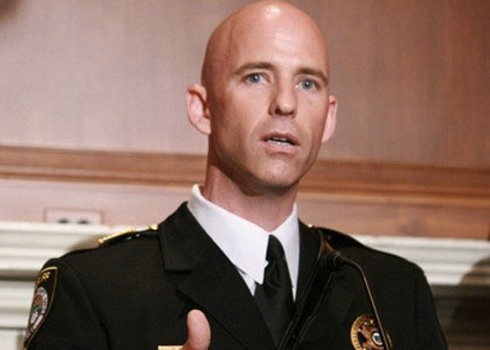Pinal County Sheriff Paul Babeu raised our eyebrows a few weeks ago by claiming that Mexican drug cartels control areas of Arizona. In a recent interview with TPM, he tempered his comments somewhat. But that didn’t stop him from suggesting that the federal government is basically surrendering territory to drug smugglers.
Earlier this month, we reported that Babeu had told The Washington Times that “Mexican drug cartels literally do control parts of Arizona,” and then how other sheriffs in Arizona told TPM that no, cartels didn’t control parts of the U.S. TPM tried to contact Babeu’s office for comment at the time, but was unable to reach Public Information Officer Tim Gaffney — we left a voicemail at a number he didn’t have access to. After the article was published, Gaffney reached out and said that Babeu was happy to speak about the matter.
In a phone interview, Babeu told TPM that when he spoke about the cartels controlling parts of the state, he meant they control movement. Babeu says cartels have scouts and other surveillance set up to monitor activity, and when the sheriff and his staff aren’t around to patrol, especially in the rural parts of his county, smugglers operate freely. Babeu’s website includes news items about drug spotters on hilltops and in caves in Arizona.
“Often times during our patrols out there, we would find cold food and a box of AK-47 rounds, you know, and some other things,” Babeu said. “There wasn’t a confrontation or a shooting, but we find these pieces of intel, that we know clearly there was somebody here on this high point. And they left because they saw us coming up 45 minutes ago. So that’s the kind of stuff that we have, that we’re asking for additional help and resources.”
Babeu says he’s understaffed, and doesn’t have the resources to keep smugglers in check all over his jurisdiction. Plus, Babeu said that just in the last year, the drug smugglers operating in his county have become better armed, and less compliant. “The tactics have changed. There have been some very significant and deliberate things that have happened that are concerning and alarming to us,” he said. And he’s livid over signs erected in his county by the Bureau of Land Management, warning citizens of the dangers of encountering drug smugglers.
“The eyes of the country are upon this issue,” Babeu said. “Even [something as] symbolic as putting signs up in our own country that are written in English, not Spanish facing south, but written in English facing north, to our own citizens. Is that not a near surrender of certain parts of my county?”
You may remember Babeu from his appearance in Sen. John McCain’s “complete the danged fence” campaign ad. He also made waves in August when he told CNS News, in response to the Department of Justice’s lawsuit against Arizona’s controversial immigration law, that “our own government has become our enemy.”
Babeu is a strong supporter of Sens. McCain and Kyl’s “10-Point Plan To Better Secure The U.S.-Mexico Border In Arizona,” which includes calls for 3,000 National Guard troops on the Arizona-Mexico border and completing the border fence in “appropriate locations.”
Babeu wants the troops to be in a “visible and visual deterrent to anyone wanting to come north.”
“A lot of people go to the extreme, and I say this, and they say ‘we’re at war!’ And I hear it out of frustration, and I try to — literally I’ve been in rooms where people who have what can be seen as extreme — have been pushed to an extreme — positions, that they want to militarize the border, and I’m not talking about that. In fact, I’m trying to say in a very thoughtful approach that no, we do not give the military law enforcement authority. That you limit their scope. There’s not rules of engagement, because we don’t have an enemy. There are rules of force.”
Once the border is secure, and only then, he says, will the country be ready to address the undocumented immigrants already here.
“Quite frankly we don’t want to deal with this in Pinal County,” he said. “It should be addressed at the border. Once we do that, this is where eventually, some day in the future, all the emotions and the anger will dissipate and then we can, as Americans, have a reasonable discussion of what we do with all those people who are here, who are here illegally.”






